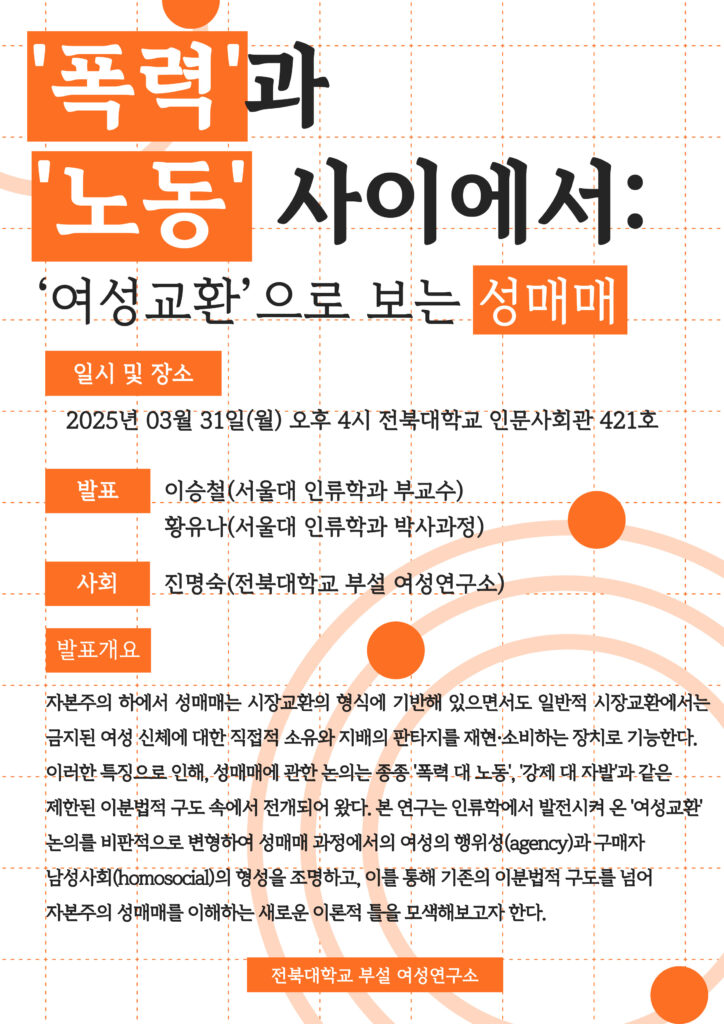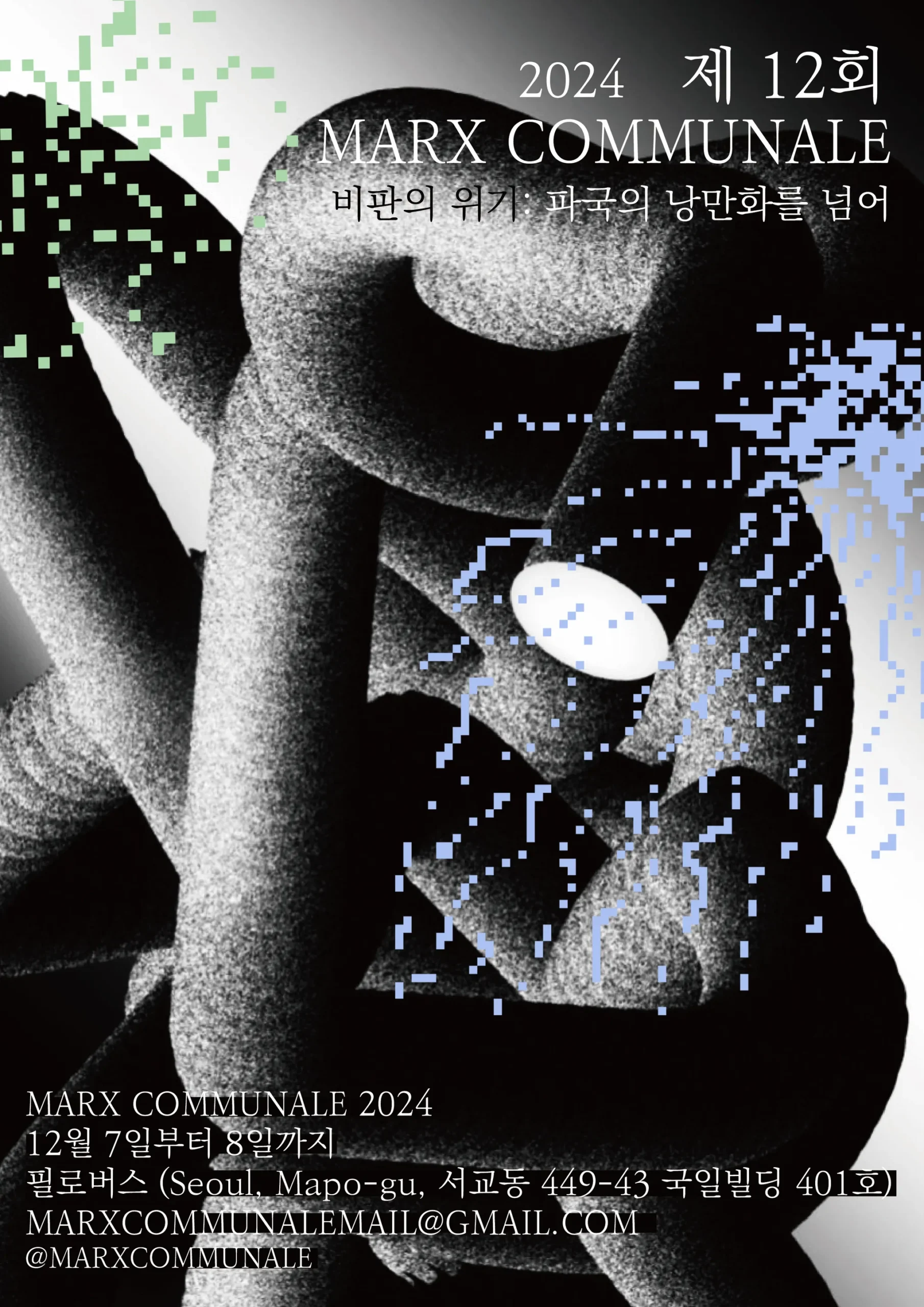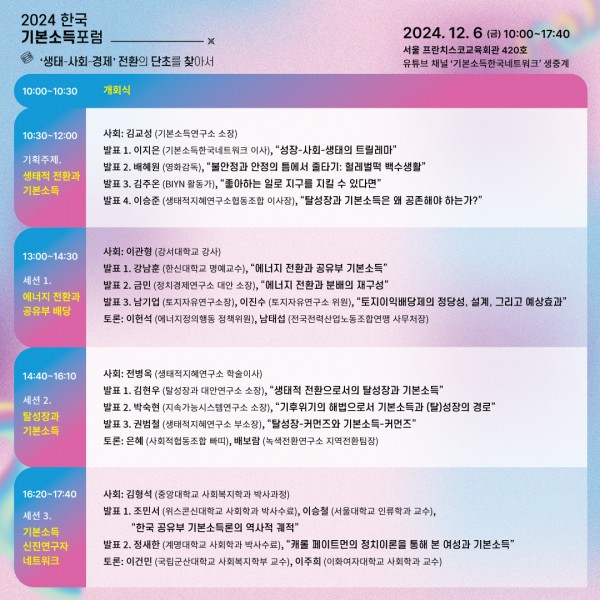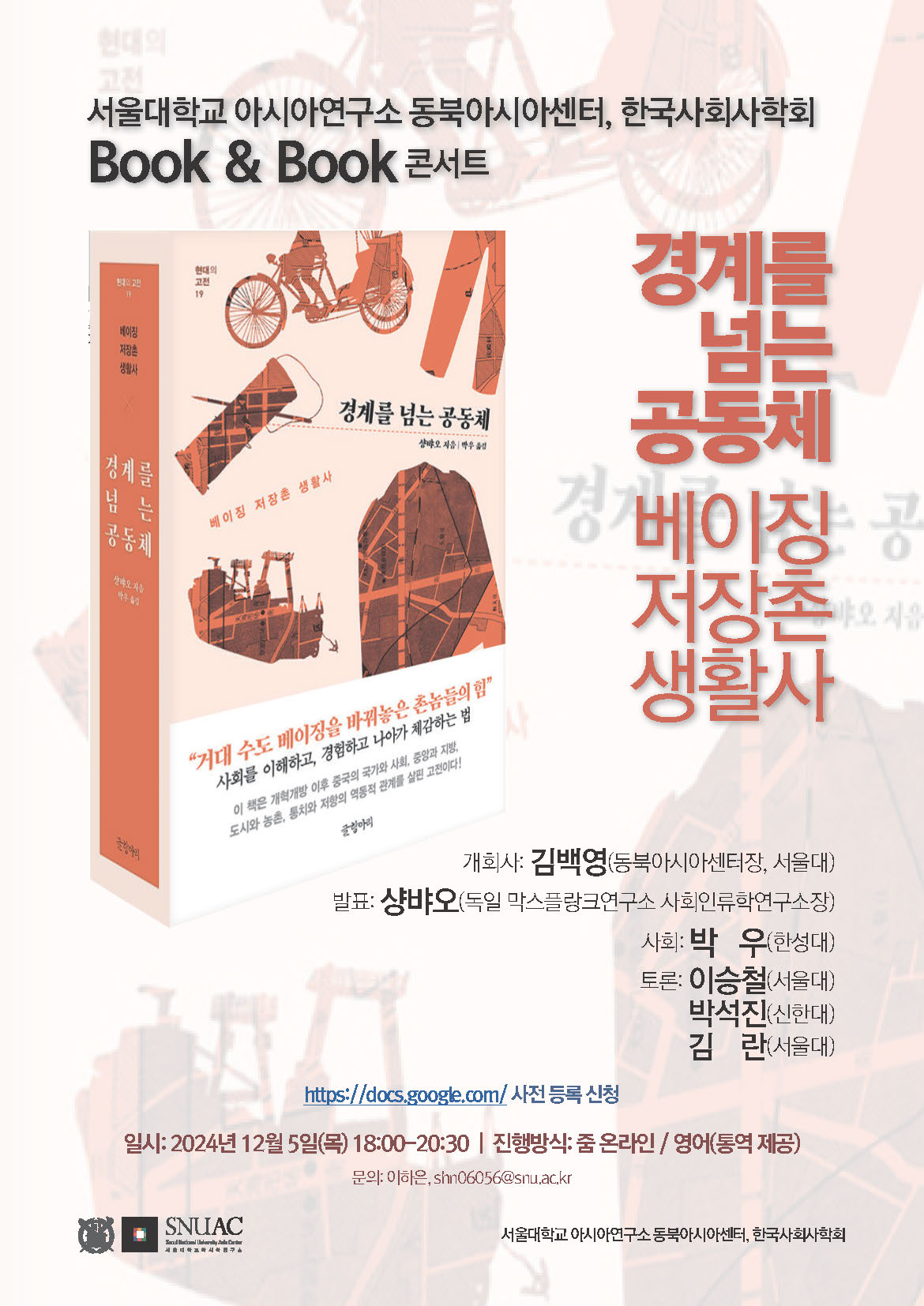3월 31일 전북대학교 여성연구소에서 “폭력과 노동 사이에서: ‘여성교환’으로 보는 성매매”라는 주제로 발표합니다.

12월 5일에 진행된 샹바오의 책 <경계를 넘는 공동체(Transcending Boundaries)> (샹바오 저, 박우 역, 글항아리, 2024) 북토크 토론문입니다. 해당 행사는 영어로 진행되어, 토론문도 영어로 작성되었습니다.
=======
Thank you for giving us the wonderful talk, as always, Biao. It is a great pleasure to see you again! I hope everything is going well for you in Halle. I’d also like to thank Dr. Park Woo and Dr. Kim Ran for inviting me to this meaningful event.
First of all, I need to confess that preparing this discussion was not easy. The immediate reason, of course, was the political turmoil in South Korea over the past two days. Like many others, I was surprised and glued to the news outlets, unable to look away. But beyond that, this book itself presents unique challenges for a discussion. It spans nearly 900 pages in its Korean translation and is filled with many detailed accounts about life in Zhejiang Village. As the author notes, “the details are another form of theory.” Reading this book, therefore, provides a very different experience compared to reading other social science works. As Dr. Xiang points out in the conclusion, reading this book goes beyond gaining a comprehensive understanding of Zhejiang Village and its history. It rather allows readers to “experience and even feel” the intimate everyday lives of the villagers.
Indeed, those who have read the book will likely agree: this book achieves precisely this. Thanks to the author’s adept writings and the translator’s efforts, readers feel as if they are actually living in Zhejiang Village, vividly experiencing the lives of its residents. This immersive experience alone makes the book immensely valuable. To borrow Michel Foucault(1981)’s terminology, it might be described as another form of “experience-book.” Conducting an academic discussion of such a work is not impossible, but it is certainly not an easy task.
Nonetheless, as a discussant, I’d like to offer a few comments and questions. Since I expect other discussants are likely to better address the book’s implications for contemporary Chinese Studies or Migration Studies, I will focus on its significance within anthropological discourse.
In my view, Transcending Boundaries represents a culmination of the so-called “network turn” in the social imaginary of the 1980s and 1990s. As is well-known, the long-standing binary of “subject vs. structure” in the social sciences began to dissolve during this period, as scholars analyzed society through the lens of networks. Key examples include Mark Granovetter’s work in economic sociology, Manuel Castells’ studies on the information society, and Bruno Latour’s “Actor-Network-Theory” in the anthropology of science. Particularly in economic anthropology, network analysis has provided a methodological alternative to the dualism of neoclassical economics, which begins with the individual, and structural functionalism or Marxism, which emphasizes the totality of economic structures.
I think that Dr. Xiang’s Transcending Boundaries engages with these intellectual currents and takes them a step further. Xiang criticizes traditional network analyses in economic sociology and anthropology for continuing to frame networks as relationships between individuals. Instead, he argues that individuals are merely the “faces” of these networks. To quote him directly: “The essence of the relationship between you and me lies in the relationship between your network and mine” (p. 751 in Korean translation). Dr. Xiang thus shifts the analytical focus from interpersonal networks to the “networks of networks” (關係叢) and the properties of their relationships. This approach moves beyond a thin conception of networks and appears to propose a thicker, denser conceptualization of social networks and connections.
These propositions are compelling and well-supported by the book’s analysis, which is likely why this book has already been recognized as a ‘contemporary classic.’ However, I’d like to raise several comments and questions, drawing on anthropologist Marilyn Strathern(1996)’s suggestion that while tracing networks is important, it can sometimes be more productive to attend where and why those networks break down.
1. One recurring critique of this book, which Xiang himself acknowledges, is the relative lack of women’s and workers’ perspectives. The dense, intricate networks described in this book represent a social composition largely built by male entrepreneurs, particularly the successful ones who emerged as influential figures. Chapter 3 reveals the existence of short-term workers, primarily women from Hebei, Anhui, and Hubei provinces, who were employed by entrepreneurs from Wenzhou. Even when Zhejiang Village’s population exceeded 100,000, nearly half of them were short-term laborers. Moreover, the experiences of women, who were primarily responsible for household economies and garment production, are largely absent from the book’s narrative. If we were to trace the networks based on their experiences, I believe the depiction of the networks in Zhejiang Village would look quite different—perhaps more fragmented, asymmetrical, and disconnected. I wonder how you think about this perspective.
2. Throughout the book, Dr. Xiang presents the state not as a monolithic entity but as loose and overlapping networks in their own right. For example, during the massive demolition of Zhejiang Village, the book highlights the discrepancies between the central government, Beijing’s municipal government, and their various departments. Zhejiang Village residents actively exploited these gaps and incorporated government officials into their own networks as survival strategies. This approach, I believe, offers a meaningful alternative to overly state-centric narratives and draws attention to the dynamic relationship between the state and society. However, I wonder: can we generalize this conceptualization of the state as porous networks, or is it specific to the temporal and spatial contexts of reform-era China? This question ties into broader inquiries about how we can understand the state through the lens of networks and how we can conceptualize the “stateness” that cannot be reduced to networks.
3. In the second preface, Dr. Xiang provides a very intriguing analysis of “formalization.” The author describes how, beginning in the late 1990s, the dense networks of ‘the informal economy’ were replaced by ‘formal’ connections to the state administration. This analysis resonates with experiences in South Korea during the same period. In South Korea, formalization dismantled existing informal networks, strengthened the administrative power of the state over civil society, and ultimately blurred the categorical distinction between the state and civil society. In doing so, however, formalization has also created new implicit networks and connections ‘within’ the state, often under the guise of “governance.” While the preface seems to primarily emphasize the limitations and harms of formalization, I wonder: can formalization also be interpreted as an innovative appropriation of the public sphere by Zhejiang Village residents, enabling them to reconfigure the public domain, rather than merely succumbing to its constraints? I would like to hear your thoughts more about formalization.
12월 7일 합정 필로버스에서 열리는 제12회 맑스 코뮤날레에서 발표합니다. 발표 제목은 “새로운 체제, 동일한 모순?: 기술봉건론과 그 함의”로, 얼마전 <문학동네>에 발표했던 기술봉건론에 대한 글을 조금 더 풀어서 논해보려고 합니다. “맑스 코뮤날레”라는 뜻깊은 행사에도 제가 속해 있는 <금융노동연구회F>에도 많은 관심 부탁드립니다.
https://www.marxcommunale2024.info/2024-MARX-COMMUNALE-13869a49b431800a8e27ff03808acc0e

12월 6일 기본소득한국네트워크에서 개최하는 <2024 한국기본소득포럼>에서 “한국 공유부 기본소득론의 역사적 궤적”이란 제목으로 발표 합니다. 발표 자체는 공동 연구자인 위스콘신대 사회학과 조민서샘이 맡아서, 현재 저와 함께 실행하고 있는 연구의 문제의식과 내용을 간략히 소개할 예정입니다. 유투브로도 중계되는 모양이니 해당 주제에 관심있으신 분들은 링크를 방문해보시는 것도 좋을 듯 합니다.
https://basicincomekorea.org/korea-ubi-forum-2024/

12월 5일 서울대 아시아연구소에서 주최하는 <경계를 넘는 공동체> 콜로키엄에 토론자로 참석합니다. 현재 독일 막스플랑크 사회인류학 연구소장으로 재직 중인 중국출신 인류학자 샹바오를 초청하여 그의 저작 <경계를 넘는 공동체: 베이징 저장촌 생활사>(박우 역, 글항아리, 2024)에 대해 이야기하는 자리입니다. 줌으로 진행되는 행사로, 사전 등록 링크도 함께 남겨놓습니다.
https://docs.google.com/forms/d/e/1FAIpQLSf6kyZlyCSFNJrfxgtgx1SirexMZgP33191qqW8Z4eCKorzwQ/viewform

꽤나 즐거운 기분으로 쓴 토론문.
=====
네 분 선생님 발표 너무 흥미롭게 잘 들었습니다. 경제인류학 분야에서 가치와 측정의 문제는 오랫동안 핵심적인 문제였고 최근 들어 점점 더 그 중요성이 부각되는 주제인데, 네 분 선생님 발표를 통해 이 주제의 중요성과 확장성에 대해 다시 한 번 확인할 수 있었습니다. 시간이 충분치 않다보니 제 토론은 개별 발표에 질문을 드리거나 코멘트를 하기보다는 이 발표문들에서 공통적으로 발견되는 중요한 테제들을 다시 한 번 정리하고, 가치측정 문제와 관련해 경제인류학/경제사회학 영역에서 이루어진 두 가지 연구사례를 짤막하게 소개하는 것으로 갈음하겠습니다.
오늘 발표들은 가치 측정의 문제를 논의할 때, 우리가 다음과 같은 점들을 염두에 두어야 한다는 것을 보여주는 것 같습니다.
1) 측정의 ‘수행성(performativity)’과 ‘가치화(valuation)’ 실천: 홍성욱 선생님이 이언 해킹의 논의를 빌어, 배종훈 선생님이 메리 더글라스와 피터 버거·토마스 루크만의 논의를 통해 보여주었듯이, 가치의 측정이라는 것은 단순히 기존에 생산된 가치를 단순히 반영 혹은 ‘재현’하는 것이 아니라, 측정 그 자체를 통해 가치의 사회적·물질적 구성에 수행적으로 참여하게 됩니다. 이 때 측정의 수행성이란 측정 자체가 측정 대상이 되는 현상에 영향을 미치고 그 가치를 조작적으로 정의하고 창출해 낸다는 의미에 한정되지 않는 것 같습니다. 위험(risk)의 측정과 보험산업 및 근대 자본주의의 등장 간의 긴밀한 관계를 지적한 석승훈 선생님의 발표에서 보듯이, 측정은 일종의 ‘공통 언어 혹은 화폐’를 제공함으로써 가치가 구성되고 순환되는 장(field)과 제도적 연결망 자체를 창출하는데 핵심적 역할을 수행합니다. 만약 우리가 이러한 측정의 수행성을 진지하게 고려한다면, 흔히 별도로 사고되는 (재현적) ‘가치평가(evaluation)’와 (실재적) ‘가치증식/생산(valorization)’이 실제로는 그리 명확하게 구분되지 않으며, 측정은 이 둘이 결합된 수행적 “가치화(valuation)” 실천으로 이해될 수 있을 것으로 보입니다(Vatin 2013; Muniesa 2014).
2) ‘질적인 것’의 측정과 양질계산(qualculation): 미래와 위험의 측정과 관련된 석승훈 선생님의 발표나 ‘소셜 임팩트’와 같이 눈에 보이지 않고 질적인 대상의 측정에 대한 박성훈 선생님의 발표는, 측정의 실천이 단순히 양적인 것 혹은 실체를 가진 것에만 국한되는 것이 아님을 보여줍니다. 제 생각에는 이러한 질적인 것의 측정을 다룰 때, ‘측정이 모든 요소를 양적인 것으로 환원한다’는 식으로 단순하게 이해하지 않는 것이 중요해 보입니다. 우리가 미래와 위험에 대해 논할 때 혹은 사회적 가치에 대해 논할 때, 꿈이나 비전, 개인적 경험과 열정 등에 기반한 여러 ‘이야기’들을 제시하게 됩니다. 박성훈 선생님이 ‘Narrative and Numbers’(애스워드 다모다란의 베스트셀링 책 제목이기도 하다)를 이야기했듯이, 이 때 열정과 정동에 기반한 스토리텔링 일반 역시, (양적 측정과는 일정정도 구분되지만) 일종의 가치화 실천이자 측정과 계산의 일부를 구성하는 것처럼 보입니다. 미셸 칼롱과 존 로는 이렇듯 질적인 것에 대한 판단을 포함하는 다양한 형태의 가치화 실천들을 일컫기 위해 ‘qualculation(양질계산)’이라는 신조어를 제시하기도 합니다(Callon and Law 2005). 오늘날 가치측정과 가치화의 실천들이 일상의 광범위한 질적인 영역에서도 작동한다는 점에서 이 양질계산의 문제는 중요한 연구대상으로 부상한 것처럼 보입니다.
3) 측정의 정치: 골상학 및 우생학, 그리고 제국주의와 측정·기입의 관계에 대한 홍성욱 선생님의 발표에서 드러나듯이, 사회문화적 맥락 속에서 행해지는 측정은 당대의 이데올로기 지형을 반영하고 동시에 적극적으로 생산하는 정치적 역할을 수행해 왔습니다. 이러한 다양한 사례들에 기반해 우리는 ‘측정의 정치’라는 것에 대해 논해볼 수 있을 것 같습니다. 제 생각에는 무엇보다 측정의 정치가 다층적이라는 사실에 주목할 필요가 있어 보입니다. 먼저 측정 방식과 그 ‘정확성’을 둘러싼 갈등과 경합의 정치가 존재합니다. 특정한 현상을 어떠한 방법으로 측정할 것인가라는 이슈는, 그 자체로 지식장에서 정치적 경합의 속성을 가집니다. 여기에 덧붙여, 앞서 지적한대로 측정 자체가 장이나 행위자 연결망을 탄생시키는 공통의 언어로 기능한다면, 측정을 통해 상이한 이해관계를 가진 행위자들의 동맹과 연합이 형성되는 정치적 차원이 존재합니다. 더 나아가 “측정해야 관리할 수 있다”는 피터 드러커의 유명한 경구나 “원격 행위(action at a distance)”에 대한 라투르의 논의처럼 측정을 통해 통치 대상을 가시화하고 관리하는 통치성(governmentality)으로서의 측정 역시, 측정의 정치의 한 층위를 이룹니다. 마지막으로 측정이 과연 누구의 관점에서 어떤 목적으로 이루어지는가라는 근본적 질문과 관련된 측정의 정치성이 존재하는 것 같습니다. 이들 층위는 서로 분리되기보다는 긴밀히 결합하여 작동하며, 이런 점에서 측정은 정치의 기반을 이루는 행위인 동시에 그 자체로 정치적 행위임을 염두에 둘 필요가 있습니다. “모든 숫자는 특수한 사회·물리적 환경 속에서 이루어진 복합적인 협상과정의 산물로서 사회적 숫자(social numbers)”라는 경제인류학의 격언을 넘어서(Guyer, Khan, and Obarrio 2010: 36), “모든 숫자는 정치적 숫자”라고 말해야 할 것 같습니다.
이러한 테제들에 기반해 경제인류학/경제사회학에서 측정의 문제를 검토한 다음의 두 가지 연구를 간략히 소개하며 토론을 마치고자 합니다.
Timothy Mitchell, Rule of Experts: Egypt, Techno-Politics, Modernity (University of California Press, 2002)
오늘날 사회적으로 가장 영향력있는 지표 중 하나는 GDP라는 데에는 이견의 여지가 없다. 또한 이 GDP가 대공황과 제2차 세계대전이라는 역사적 사건을 배경으로 뉴딜정책과 전시경제를 뒷받침하기 위해 사이먼 쿠즈네츠(Simon Kuznets)를 중심으로 한 미국의 계량경제학자 집단에 의해 발명·발전되었다는 사실 역시 잘 알려져 있다. 이 책에서 인류학자 티모시 미첼은 이러한 GDP 측정이 1950년대 이후 이집트 발전 프로그램에 도입되면서, 단순히 경제현실을 반영하는 객관적 지표로서의 역할을 넘어 경제 영역 자체를 특정한 방향으로 조직해나가는 수행성을 발휘하는 과정을 추적한다. 예컨대, GDP로 측정되지 않는 가사 노동이나 비공식 경제 등은 정책에서 배제되고, GDP를 증진시키는 화폐와 시장 경제에 집중적으로 자원이 배분되는 방식으로 GDP 지표가 수행성을 발휘했다는 것이다. 미첼은 이에 기반해 오늘날 우리가 생각하는 ‘경제’―뚜렷한 국민경제의 경계를 가지며 성장과 위기의 주체가 되고 상호비교가능한 기본 단위―라는 대상이 20세기 중반이 되어서야 탄생했다는 과감한 주장을 펼친다. 이는 특정 대상은 그것을 측정하고 순치·관리하는 장치들과의 결합을 통해서만 존재한다는 ANT의 문제의식에 기반한 주장이라 할 수 있다.
Liliana Doganova, Discounting the Future: The Ascendancy of a Political Technology (Zone Books, 2024)
미셸 칼롱의 제자이자 동료인 릴리아나 도가노바는 이 책에서 ‘미래할인’이라는 미래의 가치계산 기술의 역사에 대해 분석한다. 그녀에 따르면, 18-19세기 독일에서 숲의 가치를 어떻게 측정할 것인가를 둘러싼 논쟁 과정에서 구체화된 미래할인 테크닉은, 미래를 ‘할인’하고 현재를 강조하는 ‘금융 투자자’의 관점을 반영하는 동시에, 미래를 정치의 장으로 구성해냈다는 데에서 의의를 가진다. 이제 미래의 ‘할인율’(석승훈 선생님이 지적한 이자율)을 어떻게 결정하고 적용할 것인가를 둘러싼 정치적 경합이 발생하게 되면서, 미래를 어떻게 인식할 것인가 자체가 중요한 정치의 대상으로 편입된다는 것이다. 이 책에 서술된 대표적인 예는 1970년 칠레에서 아옌데 사회주의 정권이 집권해 초국적 자본이 소유하고 있던 구리 광산을 국유화했을 때, 이 자산의 가치를 어떻게 측정하고 보상해줄 것인가라는 쟁점이다. 이 구리 광산의 가치 측정을 둘러싼 첨예한 대립이 발생했고, 이는 잘 알려져 있다시피 1973년 CIA와 초국적 자본의 지지를 받은 피노체트의 쿠데타로 이어지게 된다.
Reference
Callon, Michel and John Law. 2005. “On Qualculation, Agency, and Otherness.” Environment and Planning D, 23(5), pp. 717~733.
Guyer, Jane, Naveeda Khan, and Juan Obarrio, 2010, “Introduction,” Anthropological Theory 10(1-2): 36-61.
Muniesa, Fabian, 2014, The Provoked Economy, London: Routledge.
Vatin, Francois, 2013, “Valuation as Evaluating and Valorizing,” Valuation Studies 1(1): 51-81.
11월 8일 서울대학교 ‘기업과 사회’ 연구회에서 “[공적] 가치의 측정, 측정의 [공적]가치”를 주제로 포럼을 엽니다. 저도 이 연구회 회원인데, 이번에는 발표가 아닌 토론만을 맡았습니다. 발표하시는 선생님들의 면면에서 보듯이, 매우 흥미롭고 심도 깊은 행사가 될 것 같습니다. 관심있으신 분들의 참여 바랍니다.
